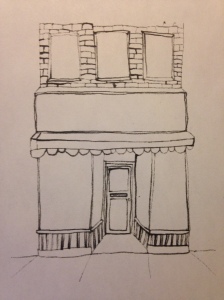International Punctuation Awareness Month (IPAM) has covered a lot so far. We’ve debated whether or not exclamation points exude lousiness or provoke emotion; we’ve disputed the prettiness of italics and the necessity of quotation marks. Colons—not of the organ variety—gained a spot light as the classy dash. And, of course, the epic battle between ellipses and dashes was brought to light. Some of these blurbs had points to make; some were just ways to explore the weirdness that is English syntax and grammar.
Have I really gotten anywhere with this month? Possibly. If only one person’s awareness is raised, I consider that a success.
Because remember: it saves lives. No one needs to be eating Grandma when they can eat with her.
So, yes, we’ve covered a lot. What could possibly be left? (Trust me, I’ve got enough ideas for the next two IPAMs but I won’t bore you with details just yet.)
How about punctuation anarchy? There are poets, like e.e. cummings and William Carlos Williams, who throw punctuation out the window. They’ve got their own style of line breaks and capitals that upset the balance. There’s simply no room for punctuation in their pieces. Numerous OULIPO poets fall into this category, along with some Dadaists as well, I’m sure.
But this final post of IPAM isn’t about punctuation disappearance—it’s about a poet I’ve met who has created her own system of punctuation because the laws of syntax and grammar didn’t provide the effects she was looking for. It’s about Nataja Flood’s system of dashes.
Just take a quick look at the poem below and see if you can figure it out.
NATAJA FLOOD
My book.
My body.My body.
Is not mainstream- – –
Manufactured and sold
in a small culture shop
in uptown Harlem,
but no one ever buys it
– – -they bypass it.It is not a New York Times best seller.
It is not on reading lists.
It has not sold out- – –
My book.My body.
No one has read it.
It is too big,
too heavy, too many pages –
small font, no spaces.
No one wants to read
my book.My body
is not a library –
people cannot just check things out.
My body is a book.
You will have something to
walk away with after reading.With beautiful trimming
around the edges, only made in hard cover,
my book is inscribed with thank you notes
to God for this body.
This book,
an eye catcher for wo(men)
looking for love
in hidden scriptures.My book.
My body.
It is a classic.Written in old English and Ebonics,
complex enough to fear,
deep enough to love,
to live in,
to be one with.It is a collection
and these are my pages –
brown
and broken down into parts.
A classic.Only one was made.
No copies or cats.
Just one book.
One body.
My body –
My book.Read carefully.
 It clicked after a couple reads for me, but a few of our peers in the workshop hated it. They didn’t understand why she couldn’t just revert to one form of dash to make it consistent. But it is consistent.
It clicked after a couple reads for me, but a few of our peers in the workshop hated it. They didn’t understand why she couldn’t just revert to one form of dash to make it consistent. But it is consistent.
The system of dashes is simple. Each hyphen, the “-“ parts, resembles a beat. Put one and it’s a quick beat, close to a comma. But it’s more than just an intake of breath. It’s an interruption, a stumble.
Put two and it’s two beats, about the same length of pause as a dash. Put three and it’s similar to the trailing of an ellipsis, but there’s always the rush, the steady sense of interruption, of tension building. Put four hyphens together and…well, you get the idea.
It’s a system that creates the kind of page poetry that can be read as performance. It’s remarkable and underrated.
So the big question is: should everyone experiment with punctuation? Syntax and grammar exist for the sole purpose of making it easy for readers to understand and grasp the concepts we express through images and alliteration and onomatopoeia.
However, are we missing something? Does punctuation restrict us when it comes to expressing emotion?
I’m not saying that there should be Punctuation Anarchy—that would be awful. Look at old texts in Latin (and the like) where punctuation is absent and grammar bombs are present and it’ll send you running to excess commas and periods.
What I am saying is that perhaps we can (and should) experiment with the system that already exists until you create something that suits your style.
